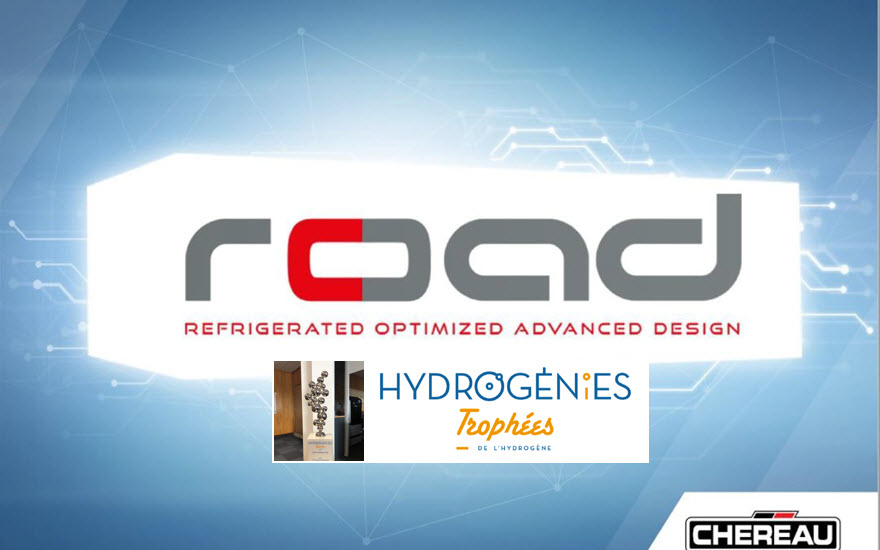
CHEREAU has been awarded the Prix des Transport des Terres Générales 2019 Hydrogen Trophies.
This prize was an opportunity for CHEREAU to discover the collaborative project ROAD, the first hydrogen refrigerated semi-trailer. ROAD is a new generation of refrigeration bodies that are more efficient and more environmentally friendly, thanks to various new technologies.
About the Project
To support its innovation policy, CHEREAU has relied on the technological expertise of the ARTS Carnot Institute to support it in its project to develop a new generation of refrigerated semi-trailers that meet the requirements of the carriers.
Business and innovation
For more than 60 years, CHEREAU has been the first European manufacturer entirely dedicated to the design and manufacture of refrigerated truck bodies. Recognized for the high quality, longevity and first-rate performance of its products, CHEREAU is characterized by a policy of permanent innovation and customized vehicles, serving the most demanding carriers.
The challenge
Refrigerated transport is an essential link in the cold chain, with strong technical and regulatory requirements. The objective of the Refrigerated Optimized Advanced Design (ROAD) project is to develop a new generation of cold chain refrigeration semi-trailers with higher performance technologies, reducing its environmental impact (noise and gas emissions), while improving operating conditions (safety and ergonomics). The three-year project began in September 2016 and is expected to be commissioned by the end of 2019.
The ROAD project partners collaborated on seven complementary technological bricks:
- Lightening : chassis weight gain through new design and multi-material technologies
- Aerodynamics : improved semitrailer design for better air penetration and reduced fuel consumption
- Thermal insulation : new generation of materials with very high thermal performance for the bodywork
- Energy : clean energy production thanks to an onboard hydrogen fuel cell
- Production of clean cold : electric refrigeration unit operating with CO2 refrigerant
- Mechanical and electrical architecture : integration of new components and optimization of the management of electrical and mechanical equipment (reduction of energy consumption, better ergonomics and new security functions)
- Tests : the concept vehicle will be tested under real conditions of use
The partnership
CHEREAU was accompanied by AMVALOR, a subsidiary of the National School of Arts and Crafts which carries with it the Carnot Institute ARTS. For example, the Angevin Laboratory of Mechanics, Processes and Innovations (LAMPA) of Arts et Métiers collaborated on three technological bricks: lightening, aerodynamics and thermal insulation.
The on-board instrumentation of a complete vehicle and the tests carried out made it possible to understand the various demands (emergency braking, turns, docking, etc.). The lightening solutions were thus validated, thanks to the use of the numerical model and the test data, without altering the robustness of the chassis. The simulation of the thermal activities (decrease of the overall conductivity coefficient) and aerodynamics (reduction of the overall drag) respectively made it possible to maintain a constant temperature within the refrigerating box and to reduce its energy consumption.
Source: Chereau and The Carnot Institute
Read the most up to date Fuel Cell and Hydrogen Industry news at FuelCellsWorks




